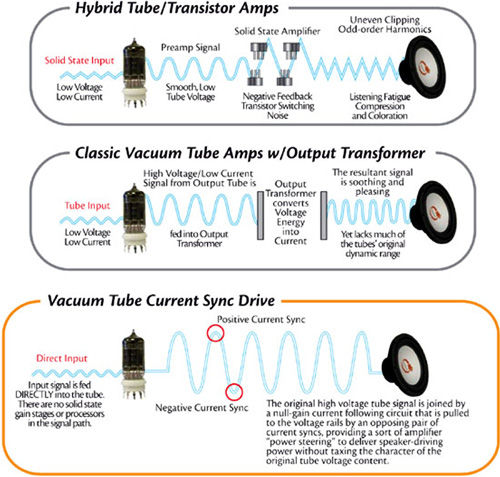GlassWolf........ question here
|
Gold Member Username: Nd4spd18Southeast PA Post Number: 1665 Registered: Jul-06 | I was reading the paper you posted of amplifier types/classes (great read BTW), and I got to the part about tube amplifiers So I wanted to know what's your opinion on "hybrid" tube amps such as this one: http://ampguts.realmofexcursion.com/USAmps_AX-TU300/ They claim their "VTCSD" is better than other hybrid amps:  I would appreciate your input on this, thanks  |
|
Gold Member Username: JuliobSanto DomingoDominican Re... Post Number: 4437 Registered: Dec-05 | i don't think tube amps are practical these days. IMO |
|
Silver Member Username: Motomattic3Post Number: 534 Registered: Oct-06 | they still make guitar tube amps but thats a whole nother world, I prefer a tube amp (mesa boogie) over all the rest the sound is so clear and deep no electric amp can touch it as far as im conserned |
|
Gold Member Username: Nd4spd18Southeast PA Post Number: 1684 Registered: Jul-06 | US Amps says this about it: " Conventional amplifiers use the same component(s) to amplify voltage and current from a "line" or preamp level to an audible "speaker" level. This includes the introduction of part of the signal slightly out of "time alignment" for the purpose of retarding high frequency response, thus stabilizing the overall circuit. These "Negative Feedback" loops can be local (contained to one critical part of the circuit), or global (pertaining to the audio output as a whole). The introduction of negative feedback is detrimental to sound quality as it introduces a certain "harshness" into the character of the sound. This is particularly true in fast-switching transistor circuits that already contend with the emphases of odd-order harmonics that are a product of their design. Tube circuits generally fare somewhat better in the presence of negative feedback. The higher voltage and slower operating speed of a tube naturally emphasizes pleasing even-order harmonics. Traditional tube amplifiers produce high voltage which is excellent for transience, attack, transparency, and staging, but are severely limited by the amount of current available to drive speakers. The final stage of a traditional tube amplifier is an "output transformer" which transforms some of the voltage energy into current. The resultant signal is better suited to drive an audio loudspeaker, but a great deal of the original tube dynamics and frequency response are lost forever. With our VTCSD (Vacuum Tube Current Sync Drive) input signal is fed DIRECTLY into the tube. There are no solid state gain stages or processors in the signal path. The original high voltage tube signal is joined by a null-gain current "following" circuit that is pulled to the voltage rails by an opposing pair of "current syncs", providing a sort of "amplifier power steering" to deliver speaker-driving power without taxing the character of the original tube voltage content. " And no offense guys, but I was asking for GlassWolf's opinion on this specific amplifier |
|
Gold Member Username: Nd4spd18Southeast PA Post Number: 1699 Registered: Jul-06 |  |
|
Gold Member Username: Nd4spd18Southeast PA Post Number: 1701 Registered: Jul-06 | bump |
|
Gold Member Username: Nd4spd18Southeast PA Post Number: 1703 Registered: Jul-06 | bump |
|
Platinum Member Username: GlasswolfWisteria, Lane USA Post Number: 11955 Registered: Dec-03 | biggest problem with vacuum tubes is generally the need to tune them constantly.. oh, and their lifespan. these days I'd just as soon stick with solid state amps. |
|
Gold Member Username: Nd4spd18Southeast PA Post Number: 1714 Registered: Jul-06 | Oh, ok thanks for the reply..... I had heard that they don't last as long as SS amps. The reason I asked about this: I got a good deal on the amp I posted above, so I decided to give it a try (haven't got it installed yet). If it doesn't work out, I can just switch to something else. Do you happen to know how often these amps generally need tuning? I am also interested to know how much difference in sound there is compared to a SS amp. But I guess I will find that out for myself  |
|
Platinum Member Username: GlasswolfWisteria, Lane USA Post Number: 11967 Registered: Dec-03 | honestly there shouldn't be any audible difference. if the amplifier colors the sound at all, it's not doing it's job properly. the amp should be as transparent as possible to reproduce the signal with a larger amplitude, as accurately as it can. as for tuning, the bias on the tubes generally has to be adjusted. I have no idea how often with that amp since I don't know what tubes it uses, or how getting knocked around in the trunk of a car will bear on them. |
|
Gold Member Username: Nd4spd18Southeast PA Post Number: 1718 Registered: Jul-06 | I see. Would you happen to know, is bias adjustment something a person (me) with a good electronics background and a decent amount of equipment (meters, O-scope, etc.) could do? Or would I have to take it somewhere. Any good websites on this topic that you recommend? Again, the help is much appreciated.....  |
|
Platinum Member Username: GlasswolfWisteria, Lane USA Post Number: 11976 Registered: Dec-03 | easy as sin to do if you have the gear. its just a screw adjustment in most cases, like setting the gain on an amp. just google setting the tube gain on a vacuum tube audio amplifier |
|
Gold Member Username: Nd4spd18Southeast PA Post Number: 1726 Registered: Jul-06 | Thanks for the info, I will google that. Actually I have seen those adjustments inside the amp, now I know what they're for  |
Main Forums
Today's Posts- Home Audio Forum
- Home Video Forum
- Home Theater Forum
- Car Audio Forum
- Accessories Forum
- All Forum Topics